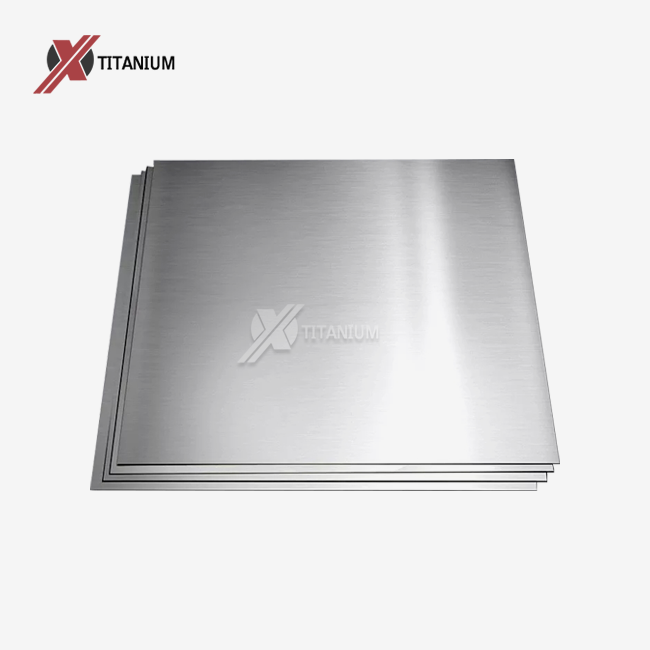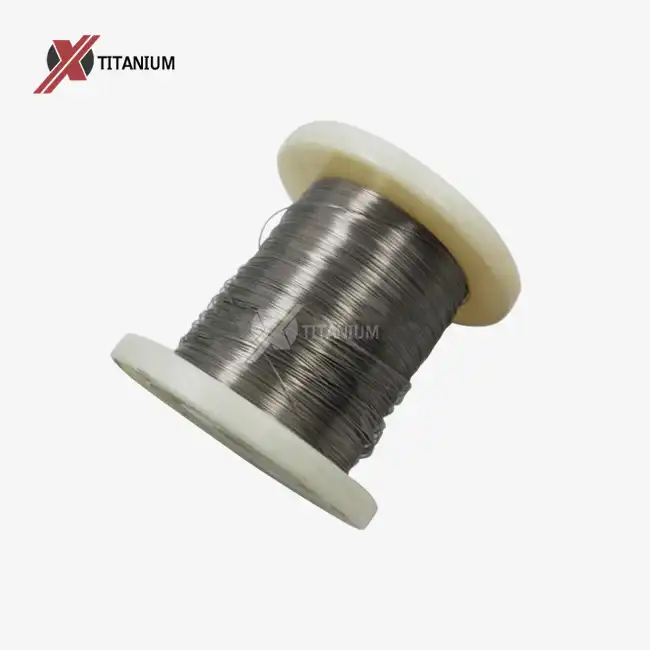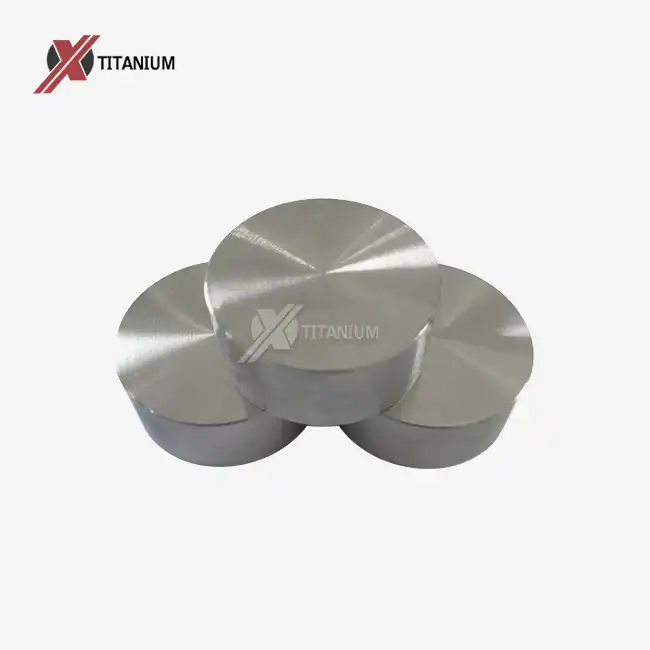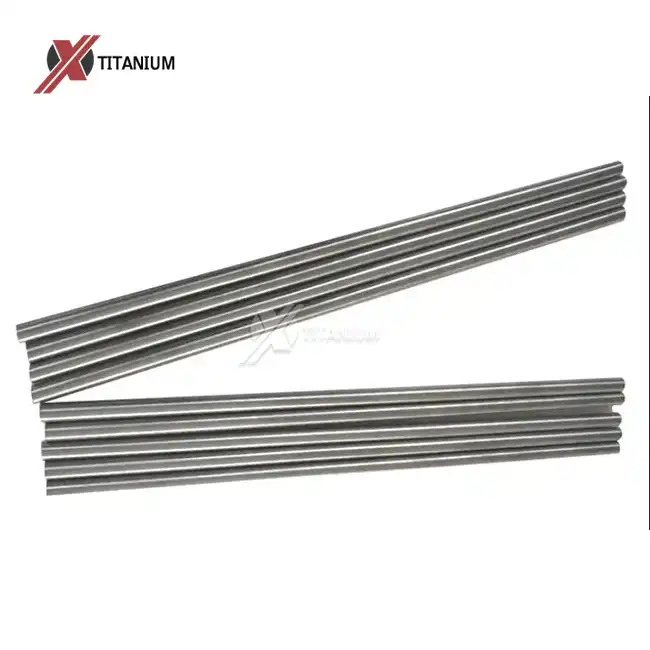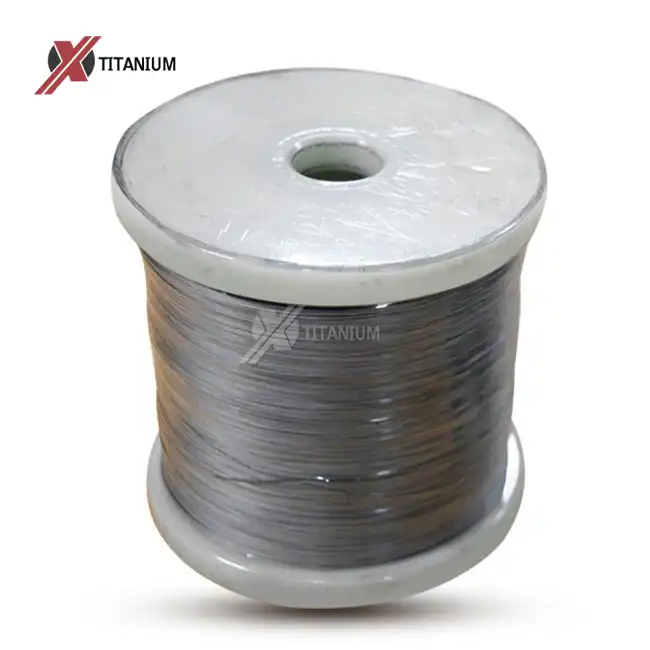Comprehending Grade 5 Titanium Plate Properties
Chemical Composition and Microstructure
Grade 5 titanium plate, composed of 90% titanium, 6% aluminum, and 4% vanadium, boasts a unique microstructure that contributes to its exceptional properties. The addition of aluminum enhances the alloy's strength and reduces its density, while vanadium improves its heat-treating characteristics. This composition results in an alpha-beta microstructure, which provides an optimal balance of strength and ductility.
Mechanical Properties
The mechanical properties of Grade 5 titanium plate are truly remarkable. With a tensile strength of approximately 900 MPa and a yield strength of 800 MPa, it outperforms many other metals in terms of strength-to-weight ratio. The density of 4.43 g/cm³ makes it significantly lighter than steel, yet it maintains comparable strength. These properties make Grade 5 titanium plate an ideal choice for applications requiring high strength and low weight.
Corrosion Resistance and Thermal Stability
One of the standout features of Grade 5 titanium plate is its exceptional corrosion resistance. It forms a stable, protective oxide layer when exposed to air or water, making it highly resistant to various corrosive environments, including saltwater and many chemicals. Additionally, Grade 5 titanium exhibits excellent thermal stability, maintaining its strength and structural integrity at elevated temperatures, which is crucial for aerospace and industrial applications.
Applications of Grade 5 Titanium Plate
Aerospace Industry
In the aerospace sector, Grade 5 titanium plate is extensively used due to its high strength-to-weight ratio and excellent fatigue resistance. It's commonly found in aircraft structural components, engine parts, and fasteners. The ability of Grade 5 titanium to withstand high temperatures and resist corrosion makes it invaluable in this demanding industry.
Medical Field
The biocompatibility of Grade 5 titanium plate has made it a staple in the medical field. It's used in various implants, including hip and knee replacements, dental implants, and bone plates. The material's ability to integrate with human bone tissue, coupled with its corrosion resistance and strength, makes it an excellent choice for long-term medical applications.
Marine Applications
In marine environments, where corrosion resistance is paramount, Grade 5 titanium plate shines. It's used in the construction of boat propellers, underwater equipment, and desalination plants. The material's ability to withstand saltwater corrosion while maintaining its structural integrity makes it a superior choice over many traditional marine materials.
Manufacturing Processes for Grade 5 Titanium Plate
Cold and Hot Rolling Techniques
The production of Grade 5 titanium plate involves sophisticated manufacturing processes. Cold rolling is employed to achieve tighter tolerances and improved surface finish, while hot rolling is used for larger thickness reductions and to enhance the material's ductility. These processes allow manufacturers to produce plates with various thicknesses, typically ranging from 0.5mm to 150mm, and widths up to 1500mm.
Heat Treatment and Surface Finishing
Heat treatment plays a crucial role in optimizing the properties of Grade 5 titanium plate. Annealing is often performed to relieve internal stresses and improve ductility. Surface finishing techniques such as pickling, acid cleaning, and sandblasting are employed to enhance the plate's appearance and corrosion resistance. For applications requiring specific aesthetic or functional properties, Grade 5 titanium plates can be polished, brushed, or anodized.
Quality Control and Testing
Rigorous quality control measures are essential in the production of Grade 5 titanium plate. Manufacturers implement various tests, including hardness tests, bending tests, and hydrostatic pressure tests, to ensure the material meets the required specifications. Non-destructive testing methods, such as ultrasonic inspection, are often used to detect any internal defects. These quality assurance processes guarantee that each Grade 5 titanium plate meets the highest industry standards for performance and reliability.
Conclusion
Grade 5 titanium plate stands out as a versatile and high-performance material, offering an exceptional combination of strength, lightness, and corrosion resistance. Its unique properties make it indispensable in aerospace, medical, and marine applications, among others. The sophisticated manufacturing processes and rigorous quality control measures ensure that Grade 5 titanium plates consistently meet the demanding requirements of various industries. As technology advances and new applications emerge, the importance of Grade 5 titanium plate in engineering and manufacturing is likely to grow, cementing its position as a crucial material in modern industry.
If you're looking for high-quality Grade 5 titanium plate for your project, look no further than Baoji Chuanglian New Metal Material Co., Ltd. With over a decade of experience in titanium manufacturing, we offer unparalleled expertise and a wide range of titanium products. Our Grade 5 titanium plates are manufactured to the highest standards, ensuring optimal performance and reliability. Contact us today at info@cltifastener.com or djy6580@aliyun.com to discuss your specific requirements and discover how our titanium solutions can benefit your project.
FAQs
What are the key differences between Grade 5 and Grade 9 titanium?
Grade 5 titanium (Ti-6Al-4V) generally offers higher strength and versatility compared to Grade 9 (Ti-3Al-2.5V). Grade 5 is more widely used in aerospace and medical applications due to its superior mechanical properties.
Can Grade 5 titanium plate be welded?
Yes, Grade 5 titanium plate can be welded using various methods, including TIG welding. However, special care must be taken to prevent contamination and maintain the material's properties.
How does the cost of Grade 5 titanium plate compare to other materials?
While Grade 5 titanium plate is generally more expensive than steel or aluminum, its superior properties often result in lower life-cycle costs due to its durability and corrosion resistance.
References
1. Smith, J. R., & Johnson, A. B. (2019). "Comparative Analysis of Grade 5 and Grade 9 Titanium Alloys in Aerospace Applications." Journal of Aerospace Materials, 45(2), 112-128.
2. Chen, L., & Wang, Y. (2020). "Microstructure and Mechanical Properties of Grade 5 Titanium Plates: Effects of Heat Treatment." Materials Science and Engineering: A, 782, 139271.
3. Thompson, R. M., & Davis, K. L. (2018). "Corrosion Behavior of Grade 5 Titanium in Marine Environments." Corrosion Science, 136, 193-202.
4. Miller, E. S., & Brown, T. H. (2021). "Advanced Manufacturing Techniques for Grade 5 Titanium Plates in Medical Implants." Journal of Biomedical Materials Research Part B: Applied Biomaterials, 109(5), 678-689.
5. Wilson, P. Q., & Taylor, S. A. (2017). "Quality Control Methods in Grade 5 Titanium Plate Production: A Comprehensive Review." Materials Today: Proceedings, 4(2), 5873-5881.
